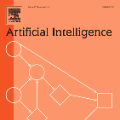The Fourth Industrial Revolution, particularly Artificial Intelligence (AI), has had a profound impact on society, raising concerns about its implications and ethical considerations. The emergence of text generative AI tools like ChatGPT has further intensified concerns regarding ethics, security, privacy, and copyright. This study aims to examine the perceptions of individuals in different information flow categorizations toward AI. The results reveal key themes in participant-supplied definitions of AI and the fourth industrial revolution, emphasizing the replication of human intelligence, machine learning, automation, and the integration of digital technologies. Participants expressed concerns about job replacement, privacy invasion, and inaccurate information provided by AI. However, they also recognized the benefits of AI, such as solving complex problems and increasing convenience. Views on government involvement in shaping the fourth industrial revolution varied, with some advocating for strict regulations and others favoring support and development. The anticipated changes brought by the fourth industrial revolution include automation, potential job impacts, increased social disconnect, and reliance on technology. Understanding these perceptions is crucial for effectively managing the challenges and opportunities associated with AI in the evolving digital landscape.
翻译:暂无翻译





